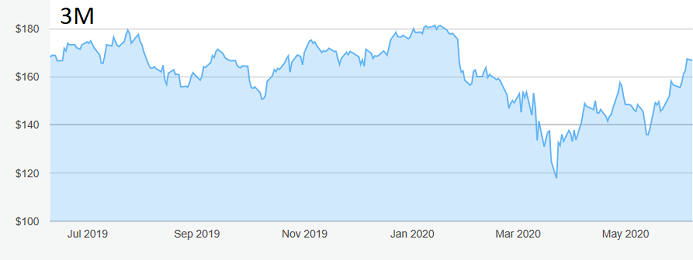3M: a defensive stock worth sticking with
The $100 billion US conglomerate should fare pretty well as we come out of the coronavirus crisis.
10th June 2020 10:20
by Rodney Hobson from interactive investor
The $100 billion US conglomerate should fare pretty well as we come out of the coronavirus crisis, argues our international investing expert.

Rodney Hobson is an experienced financial writer and commentator who has held senior editorial positions on publications and websites in the UK and Asia, including Business News Editor on The Times and Editor of Shares magazine. He speaks at investment shows, including the London Investor Show, and on cruise ships. His investment books include Shares Made Simple, the best-selling beginner's guide to the stock market. He is qualified as a representative under the Financial Services Act.
Among companies faring comparatively well, or even better than usual, during the coronavirus crisis are some that you would not particularly expect. Step forward American multinational conglomerate 3M (NYSE:MMM).
Many people remember it as a supplier of stationery such as sticky tape and Post-it notes, which would hardly get investors excited in the current economic climate. But this is a much, much bigger company with interests in industrial products, healthcare, worker safety and consumer goods, a wide enough spread to ensure that there will always be demand for at least some of its products whatever the circumstances.
Income actually rose in the first quarter of 2020, when most companies started to feel the effects of shutdowns in various parts of the world, but 3M saw demand for many of its products increase thanks to Covid-19. Total sales rose 2.7% compared with the start of 2019, with organic growth admittedly at a more mundane 0.3%. Most companies would have been happy with any level of growth in the first quarter. Pre-tax profit improved impressively from $1.1 billion to nearly $1.6 billion.
Not surprisingly, it was the healthcare business that shone, with sales up 21%, followed by consumer products gaining 4.6%. The setbacks came in safety, industrial, transport and electronics, but these could well bounce back as restrictions on working arrangements ease.

Source: interactive investor. Past performance is not a guide to future performance.
Chairman and chief executive Mike Roman admits that the financial impact of Covid-19 is inevitably varied across such a diverse business, and he has withdrawn earlier guidance for the full year, which included a forecast $9.30 to $9.75 in earnings per share.
The first-quarter figure was $2.22, up from an underlying $1.95 in the previous quarter, so it is touch and go whether that forecast can still be met.
Much depends on how well last year’s reorganisation works out. Streamlining the company structure brought a $134 million hit in the fourth quarter of 2019, mainly to cover the loss of 1,700 jobs. The idea is to give each of the four sections of the group autonomy over their entire global operations, rather than split the business along global lines, with each area setting priorities in their regions. Individual units now have full responsibility for all aspects of that part of the business across the globe.
It is too early to say whether this will work better, although it will allow for greater central control and it removes a layer of bureaucracy in the international operations organisation. Annual pre-tax savings are projected at $110-120 million eventually, with $40-50 million achieved this year.
The other major imponderable is litigation arising from discontinued businesses. Discussions continue with various litigants, but $214 million was set aside at the end of last year to cover the costs. Litigation doesn’t come cheap in the US.
These charges spoilt otherwise satisfactory results for 2019, with sales up 2% and underlying profits marginally lower. The best-performing area last year was the home territory of the US, where sales grew 7.4%.
- S&P 500 index recovers all losses from coronavirus sell-off
- Stock market rally poll: too much too soon, or only the start?
- Trading tips: how to play the recovery and mitigate risk
- Want to buy and sell international shares? It’s easy to do. Here’s how
There has of late been some concern about the sluggish level of organic growth, the maturing of some markets and weakness in the vehicle and semiconductor markets served by many of 3M’s products. However, 3M is a defensive stock that should fare comparatively well as we come out of the coronavirus crisis.
This month 3M recruited a new chief financial officer, Monish Patolawala, who is currently in a similar position at GE Healthcare, part of General Electric. He joins on 1 July and there will be an orderly one-month handover from outgoing CFO Nick Gangestad.
Hobson’s choice: The shares topped $250 briefly in January 2018 before starting a long slide to a low of $125 in mid-March, losing half their value. They have since picked up to $167 and should manage to reach $180 if the general market recovery continues. Buy up to that level.
Rodney Hobson is a freelance contributor and not a direct employee of interactive investor.
These articles are provided for information purposes only. Occasionally, an opinion about whether to buy or sell a specific investment may be provided by third parties. The content is not intended to be a personal recommendation to buy or sell any financial instrument or product, or to adopt any investment strategy as it is not provided based on an assessment of your investing knowledge and experience, your financial situation or your investment objectives. The value of your investments, and the income derived from them, may go down as well as up. You may not get back all the money that you invest. The investments referred to in this article may not be suitable for all investors, and if in doubt, an investor should seek advice from a qualified investment adviser.
Full performance can be found on the company or index summary page on the interactive investor website. Simply click on the company's or index name highlighted in the article.
Disclosure
We use a combination of fundamental and technical analysis in forming our view as to the valuation and prospects of an investment. Where relevant we have set out those particular matters we think are important in the above article, but further detail can be found here.
Please note that our article on this investment should not be considered to be a regular publication.
Details of all recommendations issued by ii during the previous 12-month period can be found here.
ii adheres to a strict code of conduct. Contributors may hold shares or have other interests in companies included in these portfolios, which could create a conflict of interests. Contributors intending to write about any financial instruments in which they have an interest are required to disclose such interest to ii and in the article itself. ii will at all times consider whether such interest impairs the objectivity of the recommendation.
In addition, individuals involved in the production of investment articles are subject to a personal account dealing restriction, which prevents them from placing a transaction in the specified instrument(s) for a period before and for five working days after such publication. This is to avoid personal interests conflicting with the interests of the recipients of those investment articles.